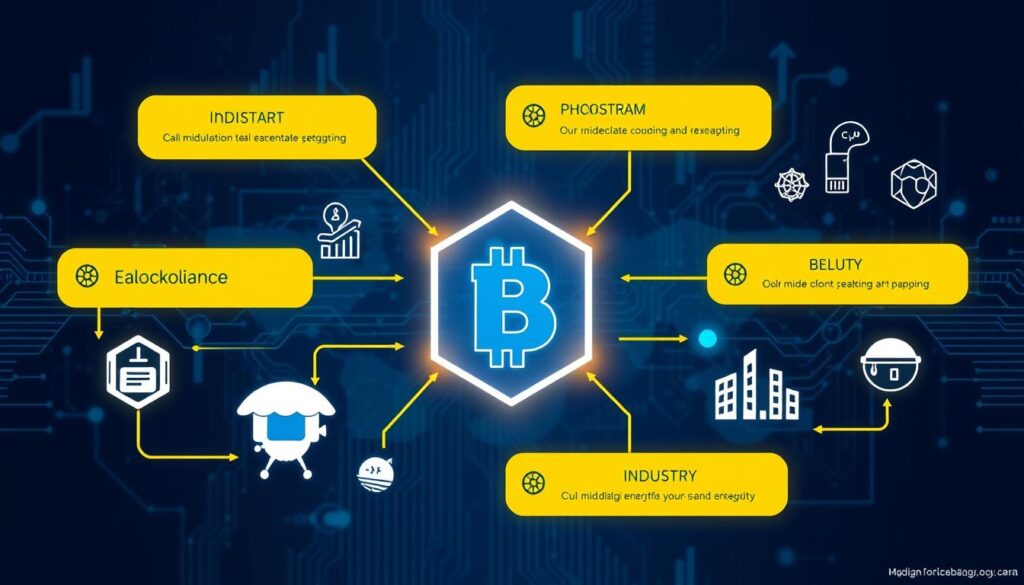The world of business is on the cusp of a revolution, with the digital transformation market poised to grow to $3,289 billion by 2030, according to Markets and Markets.
As we explore the cutting-edge trends reshaping businesses in 2025, it’s clear that technologies like AI and blockchain are not just buzzwords, but practical tools that forward-thinking companies like CoWrit Technologies Inc are leveraging to create competitive advantages.
With 77% of surveyed enterprises having started their journey in the past 2 years, as per the Newgen State of Digital Transformation Report, it’s evident that the landscape is evolving rapidly.
Key Takeaways
- The digital transformation market is expected to reach $3,289 billion by 2030.
- AI and blockchain technologies are complementing each other to create innovative business solutions.
- Forward-thinking companies are leveraging these technologies to stay ahead in the digital world.
- 77% of enterprises have started their digital transformation journey in the past 2 years.
- The United States is expected to account for nearly 35% of global spending in digital transformation.
The Current State of Digital Transformation in 2025
The current state of digital transformation in 2025 is characterized by unprecedented growth and innovation. As businesses continue to navigate the complexities of a rapidly changing technological landscape, the importance of digital transformation has never been more pronounced.
Definition and Importance of Digital Transformation
Digital transformation refers to the integration of digital technology into all areas of a business, fundamentally changing how it operates and delivers value to customers. It’s not just about adopting new technologies; it’s about using data to drive decision-making and create more personalized customer experiences. The importance of digital transformation lies in its ability to enhance efficiency, improve customer satisfaction, and drive business growth.
As noted by a recent industry report, “Digital transformation is no longer a choice but a necessity for businesses to remain competitive in today’s fast-paced digital economy.”
“The future belongs to those who embrace digital transformation and harness its power to drive innovation and growth.”
Market Growth and Statistics
The digital transformation market is experiencing explosive growth, with projections indicating it will reach $3,289 billion by 2030. According to a Newgen State of Digital Transformation Report, 77% of surveyed enterprises have started their digital transformation journey in the past 2 years. The United States is expected to account for nearly 35% of global spending in digital transformation.
| Region | Digital Transformation Spending |
|---|---|
| United States | 35% |
| Europe | 25% |
| Asia | 20% |
The adoption of cloud computing has accelerated dramatically, with multi-cloud and hybrid solutions becoming the standard approach for businesses seeking flexibility and scalability. Companies with advanced digital transformation strategies are 64% more likely to achieve their business goals.
AI Integration: Revolutionizing Business Intelligence

The integration of artificial intelligence into business processes is revolutionizing the way companies approach data analysis and decision-making. By leveraging AI, organizations can analyze vast amounts of data to gain valuable insights that inform their business strategies.
AI-Driven Decision Making
AI-driven decision-making is transforming the business landscape by enabling companies to make more informed, data-driven decisions. This is achieved through the use of sophisticated algorithms and machine learning models that can analyze complex data sets and identify patterns that may elude human analysts.
We’re seeing significant advancements in AI-driven decision-making across various industries. For instance, in banking, hyperautomation accelerates fraud detection by analyzing vast amounts of transaction data in real-time, thereby enhancing security and reducing potential losses.
Machine Learning Applications in Business
Machine learning applications are transforming business operations across every department, from marketing and sales to finance and human resources, creating unprecedented efficiency gains. We’re implementing natural language processing systems that can analyze customer feedback across multiple channels, giving businesses deeper insights into sentiment and emerging issues.
Some key applications include:
– Computer vision technology revolutionizing quality control in manufacturing by detecting defects with greater accuracy and consistency than human inspectors.
– Organizations using machine learning algorithms to optimize pricing strategies in real-time based on market conditions, competitor actions, and individual customer willingness to pay.
– Predictive maintenance applications helping businesses reduce downtime by identifying potential equipment failures before they occur, saving millions in lost productivity and repair costs.
– The integration of machine learning with robotic process automation creating intelligent workflows that can handle exceptions and make decisions without human intervention.
By embracing these machine learning applications, businesses can drive innovation, improve operational efficiency, and stay competitive in a rapidly evolving market.
Blockchain Adoption Across Industries

With its decentralized and immutable nature, blockchain is being adopted across industries to improve data integrity and security. This technology is not just transforming the way businesses operate but also enhancing their ability to secure and share data.
Smart Contracts and Decentralized Finance
Blockchain technology is revolutionizing financial services through smart contracts and decentralized finance (DeFi). Smart contracts automate agreements, reducing the need for intermediaries and increasing transaction efficiency. DeFi platforms, built on blockchain, offer financial services such as lending, borrowing, and trading, making them more accessible and transparent.
The creation of decentralized marketplaces for verified training data could revolutionize data sharing and collaboration in the ML community, fostering a more open and collaborative ecosystem. This is particularly beneficial for industries that rely heavily on data-driven decision-making.
Blockchain for Enhanced Data Security
Blockchain is transforming data security by creating immutable records that cannot be altered without consensus from the network. This provides an unprecedented level of protection against tampering and fraud. We’re implementing blockchain solutions that enhance data integrity by creating verifiable audit trails for sensitive information, particularly valuable in regulated industries like healthcare and finance.
- Blockchain technology eliminates single points of failure, making it more resilient against cyber attacks.
- Organizations use blockchain to secure supply chains by creating transparent, tamper-proof records.
- The encryption and consensus mechanisms in blockchain provide robust protection for sensitive data.
Healthcare organizations are benefiting from blockchain’s security features, using it to protect patient records while enabling secure sharing between providers when necessary for treatment.
The Intersection of AI and Blockchain Technologies
As we delve into the latest trends in digital transformation, it becomes clear that the combination of AI and blockchain is a game-changer for businesses across various sectors. The integration of these two technologies is not just a novelty; it’s a powerful synergy that is beginning to reshape the digital landscape.
Complementary Strengths and Capabilities
The convergence of AI and blockchain brings together two of the most impactful technologies of our time. Blockchain technology provides a secure, decentralized, and transparent way to store and share data, while AI brings the capability to analyze this data, identify patterns, and make informed decisions. This combination enhances data security and integrity, creating a robust foundation for various applications.
The integration of these technologies offers numerous benefits, including improved supply chain management and enhanced analytics capabilities. By leveraging blockchain’s immutable ledger and AI’s predictive analytics, organizations can optimize their business processes and models.
Use Cases of Combined AI-Blockchain Solutions
The use cases for combined AI-blockchain solutions are diverse and rapidly expanding. Some notable examples include:
- Transforming supply chain management with end-to-end visibility, where AI analyzes patterns to predict disruptions and blockchain ensures data integrity.
- Implementing smart contracts powered by AI that can adapt to changing conditions, creating more flexible business agreements.
- Enhancing healthcare by securely sharing patient data for research while maintaining privacy, with blockchain managing access controls and AI identifying valuable patterns.
- Leveraging AI-blockchain solutions in financial services for fraud detection, using AI to identify suspicious patterns and blockchain to create immutable audit trails.

These examples demonstrate the vast potential of combining AI and blockchain, offering businesses innovative solutions to complex challenges and paving the way for more efficient, secure, and transparent processes.
Cloud Computing and Edge Technology Advancements

Cloud computing and edge technology are revolutionizing the way businesses operate and make decisions. As we continue to generate vast amounts of data, the need for efficient processing and analysis is becoming increasingly important.
Multi-Cloud and Hybrid Solutions
The adoption of multi-cloud and hybrid solutions is on the rise as organizations seek to optimize their infrastructure and improve efficiency. By leveraging multiple cloud services, businesses can choose the best platform for specific workloads, enhancing overall performance and reducing costs.
We’re seeing a significant shift towards hybrid architectures that combine the benefits of public and private clouds, allowing for greater flexibility and scalability in managing data and applications.
Edge Computing for Real-Time Processing
Edge computing is transforming how data is processed by bringing computational power closer to the source of generation, dramatically reducing latency for time-sensitive applications. This technology is particularly beneficial for autonomous systems, such as self-driving vehicles, which rely on real-time processing to make split-second decisions.
The integration of edge computing with IoT devices is enabling new real-time applications across various industries, including manufacturing, healthcare, and transportation, thereby improving overall process efficiency and reducing time to insight.
Hyperautomation and Intelligent Process Optimization

Hyperautomation is revolutionizing the way organizations operate by leveraging advanced technologies to automate complex processes. By combining AI, robotic process automation (RPA), and other cutting-edge technologies, businesses can significantly enhance their operational efficiency.
RPA and AI-Powered Automation
Hyperautomation integrates AI and RPA to automate complex business processes. For instance, in banking, hyperautomation accelerates fraud detection by analyzing vast amounts of transaction data in real-time. Similarly, manufacturing firms employ RPA to automate repetitive tasks such as quality control, inventory tracking, and production scheduling, thereby improving efficiency and reducing human errors.
Impact on Operational Efficiency
The impact of intelligent process optimization on operational efficiency is transformative. Organizations are reporting cost reductions of 25-50% in automated processes while improving quality and consistency. Some of the key benefits include:
- Dramatic improvements in cycle times as hyperautomation eliminates delays caused by manual handoffs between systems and departments.
- Data-driven process optimization enabling continuous improvement, with AI systems constantly analyzing performance metrics and suggesting refinements to automated workflows.
- Significant reductions in error rates, as automated processes eliminate inconsistencies and mistakes typical of manual handling.
As we continue to adopt hyperautomation, we see business models evolving to leverage newfound operational efficiency, offering more competitive pricing, faster service, or entirely new value propositions. For more insights on how hyperautomation is shaping the future of business, visit Happiest Minds.
Cybersecurity in the Digital Transformation Era

In the era of digital transformation, protecting sensitive data and systems from cyber threats is more crucial than ever. As businesses increasingly rely on digital technologies, the risk of cyberattacks grows, making robust cybersecurity measures essential.
AI-Enhanced Threat Detection
Advanced threat detection using AI is becoming a critical component of cybersecurity strategies. AI-driven solutions can analyze vast amounts of data to identify potential threats in real-time, enabling organizations to respond swiftly to emerging risks. This proactive approach to cybersecurity is vital in today’s fast-paced digital landscape.
Zero-Trust Security Models
Zero-trust security models are fundamentally changing how organizations approach access management. By requiring continuous verification of every user and device, these models significantly reduce the risk of data breaches. Key features include:
- Implementing the principle of least privilege access to minimize user permissions.
- Integrating contextual factors into authentication decisions to create dynamic security models.
- Moving away from perimeter-based security approaches to more robust, micro-segmentation strategies.
- Replacing point-in-time authentication with continuous monitoring and verification.
These advancements in cybersecurity are crucial for organizations to safeguard customer data and ensure compliance with evolving regulations. By adopting AI-enhanced threat detection and zero-trust models, businesses can significantly enhance their cybersecurity posture and protect their digital assets.
Personalized Digital Experiences Through Data Analytics

As we navigate the complexities of digital transformation, the focus on creating tailored customer experiences has become paramount. We are witnessing a significant shift towards personalization, driven by advancements in data analytics and predictive analytics.
Customer Journey Optimization
Businesses are leveraging AI-powered chatbots, recommendation engines, and virtual assistants to enhance customer interactions. In retail, AI-driven platforms analyze past purchases and browsing history to personalize shopping experiences. This integration of technologies enables organizations to offer highly customized experiences, improving customer satisfaction and loyalty.
Predictive Analytics for Customer Needs
Predictive analytics is transforming how businesses understand and anticipate customer needs, moving from reactive service models to proactive engagement strategies. We are implementing sophisticated algorithms that analyze historical data, behavioral patterns, and contextual factors to forecast individual customer preferences and likely next actions. This enables businesses to optimize inventory and resource allocation, ensuring they can meet anticipated customer demands without excessive costs.
By harnessing the power of data and analytics, we can create more comprehensive solutions that drive intelligence in our operations. The personalization of digital experiences based on predictive insights is creating more engaging and relevant interactions that strengthen customer loyalty and increase lifetime value.
Industry-Specific Digital Transformation Trends
The digital transformation journey is unique to each industry, with different sectors leveraging technology in ways that best suit their specific needs and challenges. As we explore the various industries undergoing digital transformation, it becomes clear that the adoption of new technologies is driving significant changes in business processes and customer experiences.
Healthcare Digital Transformation
In healthcare, digital transformation is revolutionizing patient care and operational efficiency. The integration of AI and data analytics is enabling personalized medicine, while telemedicine platforms are expanding access to healthcare services. Furthermore, the use of IoT devices for remote patient monitoring is improving outcomes and reducing hospital readmissions.
These advancements are not only enhancing patient care but also streamlining clinical workflows and improving data management.
Financial Services Innovation
The financial services sector is undergoing a significant transformation with the adoption of blockchain technology and digital payment systems. These innovations are enhancing security, reducing transaction times, and improving customer convenience. Additionally, the use of AI-driven chatbots is revolutionizing customer service, providing 24/7 support and personalized financial guidance.
Manufacturing and Supply Chain Digitalization
Manufacturing firms are employing Robotic Process Automation (RPA) to automate repetitive tasks such as quality control, inventory tracking, and production scheduling, thereby improving efficiency and reducing human errors. The integration of IoT sensors throughout production facilities and supply chains is generating vast amounts of data that drive predictive maintenance, quality control, and inventory optimization.
- Digital twin technologies are creating virtual replicas of physical assets and processes, enabling simulation and optimization before changes are implemented in the real world.
- Blockchain technology is addressing longstanding challenges in supply chain transparency and traceability, creating immutable records of product journeys from raw materials to finished goods.
- The use of additive manufacturing (3D printing) is moving from prototyping to production applications, enabling more flexible manufacturing processes and reducing costs for complex or customized components.

Conclusion: Preparing Your Business for Digital Transformation
The digital transformation journey is no longer a choice but a necessity for organizations aiming to thrive in today’s rapidly evolving technological landscape. At CoWrit Technologies Inc, we understand that successful digital transformation requires a strategic approach that aligns technology adoption with business objectives and organizational culture.
To start, organizations should assess their current digital maturity and identify areas where digital technologies can create significant business value. Building a culture that embraces innovation and continuous learning is crucial for sustainable transformation. Investing in the right platforms and integration capabilities is also essential.
Security and compliance should be integral to digital transformation initiatives from the outset. The benefits of successful digital transformation include enhanced customer experiences, new revenue opportunities, and increased organizational resilience. Companies can benefit from partnering with experienced specialists like CoWrit Technologies Inc (WhatsApp: +44-7822010953) for guidance on key technologies and solutions.
By adopting a forward-thinking approach and leveraging our comprehensive services, businesses can accelerate their digital transformation journey and thrive in a competitive environment.


